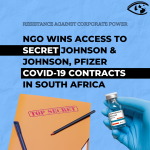UN: African Leaders Say Debt Hampers Fight Against AIDS
UNITED NATIONS -- African leaders used the opening of the UN General Assembly Special Session on HIV-AIDS Monday to assail the international community's response to the deadly epidemic for failing to match the speed and seriousness with which the disease is infecting their citizens.
Official after official rose to drive home the message that the death of
more than 20 million people, mostly in sub-Saharan Africa, demands that
more money be committed to the fight.
''If we all act decisively, we can redeem ourselves," Botswana President
Festus Mogae implored the high-level gathering.
"If resolute and concerted action is not taken against the spread of
HIV/AIDS, the human death toll and suffering that will be inflicted will be
catastrophic," Mogae warned.
Nigerian President Olusegun Obasanjo lamented that "Africa, a continent
already crippled with problems of underdevelopment, poverty, food scarcity,
internal conflicts and the heavy burden of external debt, is the hardest
hit by the HIV-AIDS pandemic.''
''Africa must survive," Obasanjo declared.
UNAIDS, the UN agency coordinating the world body's response to the
pandemic, estimates that 25.3 million people in sub-Saharan Africa are
living with HIV-AIDS, out of a worldwide total of 36.1 million.
Anti-retroviral drugs are being touted as the most effective treatment for
those already infected and African delegates said secure access at lower
prices was a top priority. Many also scored the disappointing international
response to UN Secretary-General Kofi Annan's call for between seven
billion and ten billion dollars per year for a global fund to fight AIDS
and other health threats.
By the time the UN talks end on Wednesday, the fund is unlikely to have
garnered more than one billion dollars in firm pledges, officials warned.
Uganda, a pioneer in AIDS control efforts since the 1980s, has pledged two
million dollars to the fund. Ugandan officials said they know this is too
little to make a serious impact and exhorted richer countries to
"contribute according to what is proportionate to their resources."
Even if fully financed, the fund will remain dwarfed by Africa's burden of
debt, officials and activists said.
Sub-Saharan African countries pay 14.2 billion dollars each year to their
foreign creditors, including governments, multilateral lenders including
the World Bank and International Monetary Fund, and private banks,
according to the non-governmental organisation (NGO) Drop the Debt.
The US pledge to Annan's fund -- 200 million dollars -- is equivalent to less
than a week's debt servicing.
Drawing on such statistics, some African delegates pressed for not only
increased spending on health but also the cancellation of foreign debt so
the resulting gains could be used to subsidise life-saving treatments and
offset the economic impact of HIV-AIDS.
''The circumstance and the situation of HIV-AIDS underscore our call for
total cancellation of Africa's debts in favour of investment in the social
sector. If we are to be true partners in development, the debt issue must
be addressed in a comprehensive manner that frees our resources to enable
us fight the scourge of HIV-AIDS,'' Obasanjo insisted.
''African countries need access to long-term international financing
arrangements in order to have viable sustained economic growth, generate
adequate resources and build capacities for poverty eradication and
combating HIV-AIDS, including total debt cancellation for poor and
highly-indebted countries,'' added Eriya Kategaya, Uganda's deputy prime
minister.
African delegates noted that Zambia, which is pitifully poor and where one
fifth of all adults have HIV, spends 100 million dollars more on debt
payments than on health. African leaders pressed their demands for debt
cancellation at a summit in Abuja, Nigeria, in April but to their
consternation, wealthy countries and multilateral lenders have balked at
decisive action.
Meanwhile, the human and economic costs soar. Between 1990 and 1997,
Africa's per capita income growth was reduced from 1.1 percent to 0.4
percent as a result of HIV-AIDS, according to the World Bank. Kenya's GDP
will be 15 percent lower in 2005 than it would have been if the spread of
HIV-AIDS had been curtailed.
Jacques Diouf, director-general of the UN's Food and Agricultural
Organisation, said the cost of caring for a patient and meeting the
subsequent funeral expenses exceeds the average African farmer's annual
income.
According to Annan, AIDS, combined with underlying economic woes, is
reversing southern African gains in life expectancy. The average child born
between 2002 and 2010 likely will die before reaching 45 years of age -
compared to 58 years now.
Already, children younger than five account for one in every four African
AIDS deaths, according to World Vision, an NGO. There are already 13
million AIDS orphans on the continent and, in the absence of significant
intervention, the number will rise to 30 million by 2010, the group warned.
By then, it added, the cost of training replacements for the 14,460
teachers expected to die from HIV-AIDS in Tanzania alone will reach 21
million dollars.
Despite the urgency of their needs, African leaders have had to temper
their demands for fear of alienating the wealthy nations that are the
inevitable sources of most of the money that will be needed.
Kenya's President Daniel arap Moi appeared to capture their dilemma Monday.
''We are not a wealthy nation, but my people must at least be given hope,"
he said.
''The time has come when we are compelled to make a decision between the
lives of our people and the right of commercial interest. Human life must
surely come before anything else,'' Moi said in an apparent reference to
Western drug makers who oppose poor countries' efforts to manufacture
generic AIDS drugs at a small fraction of the prices charged by the
multinational firms. "Our choice is therefore made."
The manufacturers of brand name drugs have argued, among other things, that
competition from cheaper products is squeezing their profit margins and
will limit their research budgets.
Faced with an argument that amounts to an ultimatum made by the firms and
repeated by US and other delegates from the companies' home countries, Moi
added: ''Nonetheless, we must pursue our choice in a balanced way, balanced
to protect the interests of further research and development so that life
can be further protected and enhanced.''
- 122 Pharmaceuticals
- 194 World Financial Institutions



